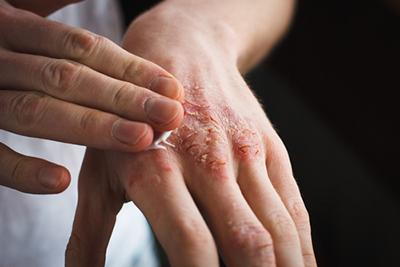
Eczema is also known as atopic dermatitis and is a chronic inflammatory skin condition. It’s often characterized by red, itchy, and inflamed patches of skin. For many individuals, eczema and allergies often go hand in hand, with allergic triggers exacerbating eczema symptoms. Understanding the connection between eczema and allergies is key to effectively managing both conditions and improving skin health. When you can understand your triggers, you can avoid them, making eczema less of a worry.
The Connection Between Eczema and Allergies
Individuals with eczema are more prone to developing allergic conditions such as asthma, allergic rhinitis (hay fever), and food allergies. Allergic triggers, such as pollen, dust mites, pet dander, and certain foods, can exacerbate eczema symptoms and lead to flare-ups. A compromised skin barrier in eczema patients also makes the skin more susceptible to allergen penetration and inflammation.
Identifying and avoiding allergic triggers is crucial for managing eczema and reducing the frequency and severity of flare-ups. Keep a journal to track potential allergens and environmental factors that coincide with eczema flare-ups. Common allergens that may exacerbate eczema may include:
- Pollen
- Mold
- Dust mites
- Pet dander
- Certain foods such as dairy, eggs, or nuts
- Harsh soaps and detergents
Managing your eczema and allergies requires a treatment plan that is tailored to your specific needs. Topical treatments like moisturizers and topical corticosteroids can help soothe dry, itchy skin and reduce inflammation associated with eczema flare-ups. Non-steroidal topical treatments may also be prescribed to control eczema symptoms and minimize the need for corticosteroids.
You should be sure to avoid your allergens as often as possible and know when to seek out help after coming in contact with an allergen. You may need to use oral antihistamines to reduce itching and allergic reactions that can irritate eczema symptoms. Be sure to keep your skin well-hydrated and moisturized throughout the day.
Contact Our Allergist Today
Make sure you understand how eczema and allergies are related. Contact your allergist to learn more about dealing with eczema and allergies today.
